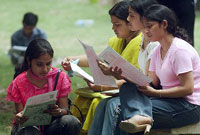(HOT) UPSC Current Affairs 2025 PDF
NEW! The Gist (NOV-2025) | E-BOOKS
(News) Civil Services Prelims: Major Changes at a glance

Civil Services Prelims: Major Changes at a glance
Earlier, the preliminary stage comprised two papers, General Studies (GS) worth
150 marks and an optional subject (chosen out of a list of 23) of 300 marks. In
the new scheme of things, total marks of the preliminary stage have been reduced
from 450 to 400. Papers 1 and 2 carry equal weight while
the time limit for both — two hours — remains as earlier. The UPSC increased the
weightage of paper-1 from 150 marks to 200. It seems to have kept the paper in
question more or less the same in terms of the broad topics, but the mental
ability section has been shifted to paper-2. The optional subject with 120
questions has been done away with. In its place, paper-2 will be common for all
candidates and include questions on comprehension, mental ability, and logical
reasoning.
According to coaching industry professionals, the examination seems to be
becoming more contemporary. Sriram Srirangam, faculty member, Sri Ram’s IAS,
Delhi, says that aspirants should peruse newspapers with a missionary zeal.
“Spend at least three hours on the newspaper every day. You should have a
genuine love for national and international events and developments.”
Dhrubajyoti Banik, course co-ordinator - civil services aptitude test and chief
knowledge expert, TIME New Delhi, says, “Till last year, whether it was
economics, geography, or sociology, the stress was on static information. For
example, in the Mughal empire, who started such and such system, etc.” Now, the
UPSC has spelt out topics like development and environmental issues.
What’s changed
Students will now have to take two compulsory papers, each of 200 marks and of two hours’ duration, in the civil services preliminary exam. The new elements in the exam for candidates going to take it in 2011:
Paper-1, 200 Marks, Two hours
- Current events of national and international importance
- History of India and Indian national movement
- Indian and world geography — physical, social, economic geography of India and the world
- Indian polity and governance — constitution, political system, panchayati raj, public policy, rights issues
- Economic and social development — sustainable development, poverty, inclusion, demographics, social sector initiatives
- General issues on environmental ecology, biodiversity and climate change — that do not require subject specialisation
- General science
Paper-2, 200 Marks, Two Hours
- Comprehension
- Interpersonal skills, including communication skills
- Logical reasoning and analytical ability
- Decision-making and problem-solving
- General mental ability
- Basic numeracy (numbers and their relations, orders of magnitude etc; Class 10 level), data interpretation (charts, graphs, tables, data sufficiency etc; Class 10 level)
- English language comprehension skills (Class 10 level)
- Questions relating to English language comprehension skills of Class 10 level are going to be tested through passages in English language without
courtesy: hindustantimes.com

